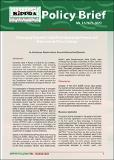| dc.contributor.author | Karanja, John | |
| dc.contributor.author | Mwatu, Shadrack | |
| dc.contributor.author | Malot, Kenneth | |
| dc.contributor.author | Odhiambo, Paul | |
| dc.date.accessioned | 2023-01-26T07:00:55Z | |
| dc.date.available | 2023-01-26T07:00:55Z | |
| dc.date.issued | 2022 | |
| dc.identifier.uri | https://repository.kippra.or.ke/handle/123456789/4059 | |
| dc.description.abstract | Domestic trade in Kenya is critical for job creation,
improving household livelihoods, and ensuring
economic resilience. The Kenya Vision 2030
emphasizes the importance of promoting genderresponsive
trade policies that enable disadvantaged
populations, such as women, to participate in
domestic trade. The participation of male and femaleowned
firms in domestic trade is guaranteed under
the Constitution, Article 27 (3), which provides for
equal economic treatment and opportunities for men
and women. | en |
| dc.language.iso | en | en |
| dc.publisher | The Kenya Institute for Public Policy Research and Analysis (KIPPRA) | en |
| dc.relation.ispartofseries | Policy Brief;No. 12 of 2022/2023 | |
| dc.subject | Domestic Trade Participation | en |
| dc.subject | Female and Male-owned Firms | en |
| dc.subject | Innovation | en |
| dc.subject | Business Registration | en |
| dc.subject | Credit Access | en |
| dc.title | Policy Brief No. 12 of 2022/2023 on Enhancing Domestic Trade Participation by Female and Male-owned Firms in Kenya | en |
| dc.type | Other | en |
| ppr.contributor.author | The Kenya Institute for Public Policy Research and Analysis (KIPPRA) | en |

